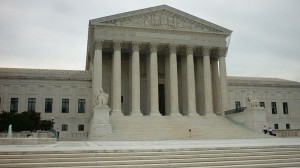 Washington, D.C. — The nine justices of the Supreme Court heard oral argument in the case of United States v. Windsor today, insinuating that the court might leave the argument over homosexual “marriage” up to the states.
Washington, D.C. — The nine justices of the Supreme Court heard oral argument in the case of United States v. Windsor today, insinuating that the court might leave the argument over homosexual “marriage” up to the states.
The debate follows Tuesday’s hearing over the validity of California’s Proposition 8, which barred same-sex “marriage” in the state by the will of the people. As previously reported, the court seemed to be divided over the matter, with even liberal justices such as Obama appointee Sonia Sotomayor questioning the attorneys seeking to legalize homosexual “marriage.”
“If you say that marriage is a fundamental right, what state restrictions could ever exist?” she inquired. “Meaning, what state restrictions with respect to the number of people, with respect to the incest laws, the mother and child, assuming that they are the age — I can accept that the state has probably an overbearing interest on protecting a child until they’re of age to marry, but what’s left?”
However, today, the court seemed to display a different tone in that the majority of the justices questioned the need for a federal Defense of Marriage Act, as well as its ban on providing certain benefits to homosexuals. Justice Elena Kagan also questioned the entire motivation behind the existence of the law.
“[W]hen Congress targets a group that is not everybody’s favorite group in the world, [it is important] that we look at those cases with some – even if they’re not suspect — with some rigor to say, do we really think that Congress was doing this for uniformity reasons, or do we think that Congress’s judgment was infected by dislike, by fear, by animus and so forth?” she stated. “[M]aybe Congress had something different in mind than uniformity.”
To demonstrate her point about dislike and animus, she read from a Congressional document that outlined the purpose for DOMA, which was “to reflect an honor of collective moral judgment and to express moral disapproval of homosexuality.” Paul Clement, the attorney defending DOMA before the court, understood that Kagan was decrying the motivation of Congress as being discriminatory.
“Of course the House report says that. I think if that’s enough to invalidate the statute, you should invalidate the statute,” he answered. “[But] this Court, even when it’s to find more heightened scrutiny, the O’Brien case we cite, it suggests, look, we are not going to strike down a statute just because a couple of legislators may have had an improper motive.”
However, Justice Anthony Kennedy seemed to have a different focus throughout the hearing, which was whether the federal government should simply leave the matter up to the states.
“The question is,” he asserted, “whether or not the federal government … has the authority to regulate marriage.”
“[DOMA] has 1,100 laws, which in our society means that the federal government is intertwined with the citizens’ day-to-day life, you are at real risk of running in conflict with what has always been thought to be the essence of the state police power, which is to regulate marriage, divorce, custody,” he continued.
Clinton appointee Justice Ruth Bader Ginsburg opined that DOMA, with its prohibition on granting certain federal marriage benefits to homosexuals, created two classes of marriage: full marriage and “skim milk marriage.”
However, Justice John Roberts, who some believe may be instrumental in the outcome of the case, appeared to note an agenda behind the homosexual lobby, stating that homosexuals are “falling over themselves” in an effort to get their way. On the other hand, he also questioned why Barack Obama continues to enforce the law.
“[I]f he has made a determination that executing the law by enforcing the terms is unconstitutional, I don’t see why he doesn’t have the courage of his convictions and execute not only the statute, but do it consistent with his view of the Constitution, rather than saying, ‘Oh, we’ll wait till the Supreme Court tells us we have no choice,'” Roberts said.
He also continued the discussion that Kagan began, and questioned whether most of Congress disapproved of same-sex nuptials because of religious or ethical reasons.
“Eighty-four senators based their vote on moral disapproval of gay people?” he asked.
The case before the court, United States v. Windsor, centers on 83-year-old lesbian Edith Windsor. She first challenged DOMA in November 2010 after being required to pay $363,053 in estate taxes following the death of her lesbian partner, Thea Spyer, whom she had been in a relationship with for 44 years. The two reportedly were “married” in Canada in 2007 when Windsor was 78.
DOMA passed Congress in 1996 with tremendous support from both houses and was subsequently signed by then President Bill Clinton.
Become a Christian News Network Supporter...


